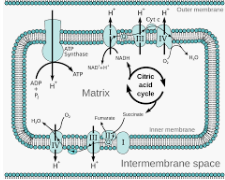OXIDATIVE PHOSPHORYLATION Multiple Choice Questions :-
1. FAD is reduced to FADH2 during
A. electron transport phosphorylation
B. lactate fermentation
C. Krebs cycle
D. glycolysis
Answer: C
2. During glycolysis, electrons removed from glucose are passed to
A. FAD
B. NAD+
C. acetyl CoA
D. pyruvic acid
Answer: B
3. A biological redox reaction always involves
A. an oxidizing agent
B. a gain of electrons
C. a reducing agent
D. all of these
Answer: D
4. Coenzyme Q is involved in electron transport as
A. directly to O2
B. a water-soluble electron donor
C. covalently attached cytochrome cofactor
D. a lipid-soluble electron carrier
Answer: D
5. The carbon dioxide is primary a product of
A. Krebs cycle
B. glycolysis
C. electron transport phosphorylation.
D. lactate fermentation.
Answer: A
6. Which of the following is not a feature of oxidative phosphorylation?
A. Direct transfer of phosphate from a substrate molecule to ADP
B. An electrochemical gradient across the inner mitochondrial membrane
C. A membrane bound ATP synthase
D. A protonmotive force
Answer: A
7. Which of the following is not a significant biological oxidizing agent?
A. FAD
B. Fe3+
C. O2
D. NAD+
Answer: B
8. How many CO2 molecules are exhaled for each O2 molecule utilized in cellular respiration?
A. 1
B. 3
C. 6
D. 12
Answer: A
9. What happens after glycolysis when oxygen is available as an electron acceptor?
A. Pyruvate is formed
B. NADH is produced
C. Fermentation
D. Oxidative phosphorylation
Answer: B
10. Lactic acid is produced by human muscles during strenuous exercise because of lack of
A. oxygen
B. NAD+
C. glucose
D. ADP and Pi
Answer: A

OXIDATIVE PHOSPHORYLATION Objective type Questions with Answers
11. Which of the following is correct sequence of processes in the oxidation of glucose?
A. Krebs cycle – glycolysis – electron transport
B. Glycolysis – Krebs cycle – eletron transport
C. Electron transport – Krebs cycle – glycolysis
D. Krebs cycle – electron transport – glycolysis
Answer: B
12. In electron transport, electrons ultimately pass to
A. ADP
B. cytochrome b
C. oxygen
D. none of these
Answer: C
14. During electron transport, protons are pumped out of the mitochondrion at each of the major sites except for
A. complex I
B. complex II
C. complex III
D. complex IV
Answer: B
15. The aerobic breakdown of glucose known as respiration involves
A. electron transport phosphorylation
B. glycolysis
C. Krebs Cycle
D. all of the above
Answer: D
![MCQs [2024]](https://engineeringinterviewquestions.com/wp-content/uploads/2021/02/Interview-Questions-2.png)